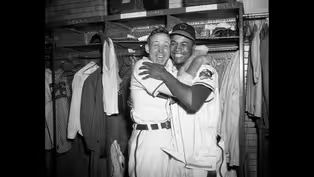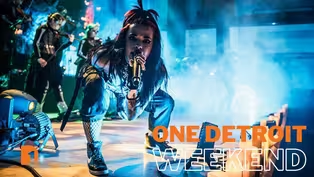
Children’s book teaches youth about the Civil Rights Movement in Detroit
Clip: Season 9 Episode 34 | 5m 2sVideo has Closed Captions
Children’s book from author Sharon Sexton teaches youth about the Civil Rights Movement in Detroit.
The children’s book, “MLK Jr.'s Detroit Dream: Memoir of a Civil Rights Foot Soldier,” from historian and author Sharon Sexton is helping youth understand the history of the Civil Rights Movement in Detroit and its impact today. One Detroit Producer Will Glover talks with Sexton about her book, making Black history accessible to youth and bridging generational gaps through storytelling.
Problems playing video? | Closed Captioning Feedback
Problems playing video? | Closed Captioning Feedback
One Detroit is a local public television program presented by Detroit PBS

Children’s book teaches youth about the Civil Rights Movement in Detroit
Clip: Season 9 Episode 34 | 5m 2sVideo has Closed Captions
The children’s book, “MLK Jr.'s Detroit Dream: Memoir of a Civil Rights Foot Soldier,” from historian and author Sharon Sexton is helping youth understand the history of the Civil Rights Movement in Detroit and its impact today. One Detroit Producer Will Glover talks with Sexton about her book, making Black history accessible to youth and bridging generational gaps through storytelling.
Problems playing video? | Closed Captioning Feedback
How to Watch One Detroit
One Detroit is available to stream on pbs.org and the free PBS App, available on iPhone, Apple TV, Android TV, Android smartphones, Amazon Fire TV, Amazon Fire Tablet, Roku, Samsung Smart TV, and Vizio.
Providing Support for PBS.org
Learn Moreabout PBS online sponsorship(dramatic music) - You just released a new book and I just want you to first tell me what the title of that book is, and then we can jump into what it's about.
- My book is called "MLK Jr.'s Detroit Dream: Memoir of a Civil Rights Foot Soldier", who would be me.
And basically, it's a children's history book, but there's a sneaky little secret with it.
And that is, (Will lightly chuckles) it's also a memory book for seniors or the baby boomers, who actually experience the civil rights time, and especially this five-year period that I talk about in the book, which is between when Martin Luther King came to Detroit and walked down or marched down Woodward Avenue, and it goes through his assassination.
And that was only five years, but that five years was packed so much with so many things happening in the civil rights movement.
It boggled my mind.
I said, I didn't realize all that happened during that time.
So, hopefully it's something that a grandmother or grandfather can, when they're babysitting for the kids, and say, okay, I brought a book.
Come in here, come and listen to this.
And as they're reading the book, hopefully it'll bring back their own memories and they can tell their grandchildren what they were doing at the time.
- Why did you decide to put this story into a book?
- Well, basically, I'm a historian, as well as a broadcaster, as well as a lot of other things.
When I had ascended to become the chairperson of the Black Historic Sites Committee, which operates out of the historical museum, we were in the process of coming out the pandemic, and we had a guest speaker who didn't show up.
And the kids were getting all bored.
(Will chuckles) And it's like, well, let me tell them about when Martin Luther King came to Detroit.
So, I just went up and I'm a little animated, if you can tell, and I started telling the story about how my dad tricked me into going to this parade.
And we got all dressed up and I'm wondering, why are we getting dressed up to go to a parade?
And it ended up being the march, Martin Luther King's march here in Detroit.
And it hit me.
I was eight years old and it struck me in a way that changed my life at eight years old.
And so, I was telling the story to the kids, and it wasn't really saying exactly what he was saying, but my feelings, (chanting) And said, what is all this coming down the street?
And so, by the end of this, I had these group of little kids, we were marching around the museum singing... ♪ We shall overcome And I'm thinking, and these are White kids.
And I'm thinking, hmm, if you make a story or you make history interesting so that people can identify with it, then they won't dislike it.
- Hmm.
- And so, I started writing my book and I didn't realize that so much happened between 1963 and 1968 when Martin Luther King was assassinated.
- Why is it important that you decided to tell this story from the perspective of a child and not just talk about what happened to you as a child?
- Because I didn't want a lecture.
Because so many times you are in a lecture, okay, and this is what happened in 1963, and (mumbles) (Will chuckles) Oh my god.
But the whole dynamics between a child and a parent as a parent is trying to teach them something about history, which is being made today, similar to what's happening today.
So, I hope you parents out there are taking your children aside and explaining something to them.
They'll appreciate it later.
- Are there parallels that you see today that were happening back then?
And how would you suggest that parents talk to their kids about those things today?
- Well, I don't know if the parents are the ones to explain it, because they didn't go through it.
A few years ago, they were celebrating the 40th anniversary of the '67 race incident in Detroit, and people were saying, "Sharon, do you wanna go and give me an...
I said, no, I don't wanna even talk about.
No, no, no.
But then, I realized that you have to talk about it and let the young people know because what's written in these history books ain't necessarily so.
So, you need to go and talk to the people who actually experienced it, so that you can have an understanding of what it was like to be there.
- You've done a lot so far, and I think this book is a great addition to the things that you've achieved.
What's next?
- Well, I do have six other books that are waiting to be published.
(Will chuckles) - [Will] My goodness.
- One is a novel and I'm so thrilled with novel.
because a novel is dealing with Black history in Detroit that has not been exposed yet.
Iconic hug photo from 1948 World Series, a symbol against racism nearly 80 years later
Video has Closed Captions
Clip: S9 Ep34 | 11m 51s | The story behind an iconic photo of an interracial hug during Game 4 of the 1948 World Series. (11m 51s)
Things to do around Detroit this weekend: February 21, 2025
Video has Closed Captions
Clip: S9 Ep34 | 1m 35s | One Detroit shares a roundup of events happening around Detroit on "One Detroit Weekend.” (1m 35s)
Providing Support for PBS.org
Learn Moreabout PBS online sponsorship
- News and Public Affairs

Top journalists deliver compelling original analysis of the hour's headlines.

- News and Public Affairs

FRONTLINE is investigative journalism that questions, explains and changes our world.












Support for PBS provided by:
One Detroit is a local public television program presented by Detroit PBS

